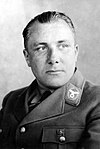Welcome! Check out today's deaths, recent deaths, or our deaths stats.
Feeling experimental? Head on over to our newest (and darkest) feature: Next-2-Die™ predictions
 Norman Borlaug
Norman Borlaug


American biologist.
Born March 25th, 1914 in Cresco.
Died September 12th, 2009 at 95 years old in Dallas (non-Hodgkin lymphoma). [ref]
Norman Ernest Borlaug, world-renowned scientist, humanitarian, and Nobel Laureate, died on September 12, 2009, in Dallas, Texas, at the age of 95. Borlaug was best known for his contributions to the agricultural revolution that increased world food production and saved millions of lives in the mid-20th century. He was famously known as the “father of the Green Revolution” for his work in developing high-yielding wheat varieties, advances in crop production, and food distribution efforts. Born in Saude, Iowa, U.S., on March 25, 1914, Borlaug received his PhD in plant pathology and genetics from the University of Minnesota in 1942. He began his career as an agricultural scientist in 1944, working for the Cooperative Wheat Research and Production Program in Mexico, a program which he would later become director of. Among his many awards and honors, Borlaug was recipient of the 1970 Nobel Peace Prize, the Presidential Medal of Freedom, the Congressional Gold Medal, and the Padma Vibhushan, India’s second-highest civilian award. His efforts in support of world hunger have been credited with saving the lives of more than a billion people. He remained active in his work until his death. Throughout his life, Borlaug always believed that “food is the moral right of all who are born into this world.” He was a tireless advocate for improving the lives of the world’s most vulnerable people. He is survived by his wife, two children, five grandchildren, and four great-grandchildren.
You might also be interested in...





No one is actually dead until the ripples they cause in the world die away. Terry Pratchett